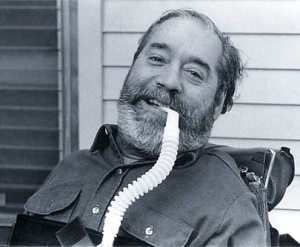
(Courtesy of Independence Now)
In July, we celebrate disability pride month, to recognize the passing of the Americans with Disabilities Act (ADA) on July 26th, 1990. The first official celebration of Disability Pride Month occurred in July 2015, which also marked the 25th anniversary of the ADA.
Ed Roberts was born in 1939 in San Mateo, California. He and his entire immediate family contracted polio when Ed was 14 years old. Everyone eventually recovered, but Ed was left with significant respiratory, muscle, and limb weakness and atrophy. As a result, he slept in an iron lung and had to teach himself different breathing techniques in order to function away from his iron lung during the day.
Because of this medical equipment, Roberts attended his classes by listening in on the telephone. He spent eighteen months receiving treatment until he returned home. After returning to his school in person, Roberts realized that many students with disabilities (like himself) faced discrimination. His school refused to allow him to graduate because he was unable to complete the driver’s education and physical education credits. Nonetheless, Roberts successfully petitioned his school to grant him his diploma.
Later, Roberts was accepted to the University of California, Berkeley. College administrators tried to reverse Roberts’ acceptance when they realized that he was quadriplegic. Representatives of the school claimed that the dorms on campus did not have the appropriate equipment or space to accommodate Roberts’ 800-pound iron lung and his wheelchair. Roberts insisted on enrolling in classes, though, and he became the first student at his university to use a wheelchair.
When more disabled students started to arrive on campus, they joined with Roberts to establish a group called The Rolling Quads, as well as the first disability-led student organization in the United States. As a club, they pressured UC Berkeley to design more accessible classroom and dorm buildings for students with disabilities. They provided disability services, such as transportation and wheelchair repair, and advocated for greater physical access to their campus, including taking sledgehammers to curbs in order to create curb cuts. The Physically Disabled Students Program would inspire Roberts to create a community in Berkeley where people with physical disabilities could live as independently as possible. Founded in 1972, this community was the first Center for Independent Living.
In 1964, Roberts earned his BA, and he received his MA two years later. While he was accepted as a Ph.D. student, he never completed his degree; however, he taught political science courses at UC Berkeley for six years. Roberts later directed California’s Department of Rehabilitation. He also co-founded the World Institute on Disability, a program that continues to educate students about disability and he served as an advocate until his death in 1995.
Resources:
Americanbar.org. (n.d.). https://www.americanbar.org/groups/diversity/resources/celebrating-heritage-months/disability-pride-month/
Olson, E. (2020, January 28). Ed roberts day: Honoring pioneer for equality and disability rights. Access Living. https://www.accessliving.org/newsroom/blog/ed-roberts-a-pioneer-for-equality/
U.S. Department of the Interior. (n.d.). Ed Roberts (U.S. National Park Service). National Parks Service. https://www.nps.gov/people/ed-roberts.htm